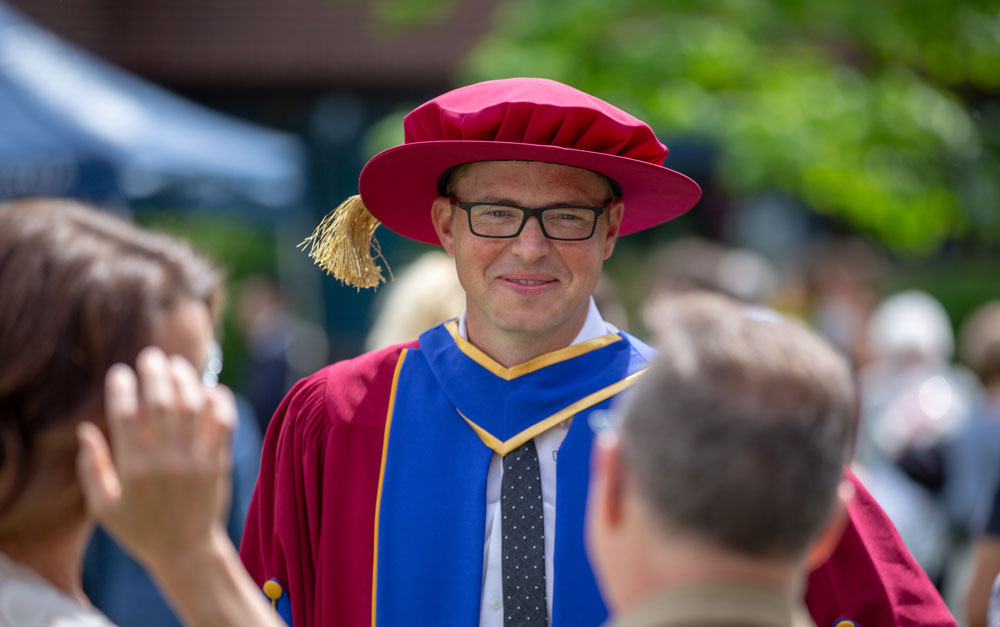Inquire
School of Nursing
Okanagan Campus
ubco.nursinggrad@ubc.ca
School of Nursing
Okanagan Campus
ubco.nursinggrad@ubc.ca

Dr. Ryan Wilson is a Postdoctoral Research Fellow in the School of Nursing at the University of British Columbia Okanagan campus. The focus of his PhD research explored the symptom experiences of patients with new onset atrial fibrillation. Ryan’s interest in cardiovascular research stems from his emergency room nursing background, where he he spent 10 years practicing.
The School of Nursing at the Okanagan Campus has pioneered flexible delivery methods for graduate students in the Okanagan region and has significant experience in providing high quality graduate education to students within the province, across Canada, and internationally. The primary methods of instruction for the PhD in Nursing include:
| Program | Components | Expected Duration |
| PhD | Dissertation | 48 months |
For more information on the PhD in Nursing Program, please review the MSN/PhD Nursing Handbook
In addition to the general academic regulations for graduate students set out by the College of Graduate Studies, the minimum requirements for the PhD in Nursing are:
Students typically complete a comprehensive examination within the first 24 months in the program. After completing required coursework, students prepare an annotated bibliography. This serves as the foundation for the comprehensive exam, which comprises two essays in the form of a take home exam and an oral defence.
Students must complete their candidacy exam within the first 36 months in the doctoral program. After completing the comprehensive exam, students establish their supervisory committee and proceed to develop their proposal. The written proposal is approved by the committee, and is followed by an oral defense.
The primary objectives of the PhD in Nursing program are to:
For information about courses and schedules see Program Requirements in the Academic Calendar. —
The following learning outcomes for the PhD in Nursing identify what knowledge, skills and abilities students will have upon successful completion of all program requirements. These learning outcomes will be achieved through completion of required coursework, a comprehensive examination, and completion of a dissertation research project.
Graduates will be able to:
To assume leadership as a nursing scholar, students will develop a portfolio of relevant experiences that show how they have achieved selected leadership competencies in conjunction with NRSG 601 (Graduate seminar). These will be accomplished through a range of learning experiences tailored to individual needs. Leadership competencies may include the following:
The required coursework comprises nine credits (NRSG 580, NRSG 581, and NRSG 554), plus two terms enrolled in the NRSG 601 doctoral seminars (3 credits). Additional courses may be recommended based on the individual candidate profile.
NRSG 580 (3) Philosophy of Evidence in Nursing
This course introduces the philosophy of science and evidence as this is understood in the context of nursing scholarship. It creates the philosophical foundation upon which students can create informed claims about knowledge, theory and evidence regarding phenomena of concern to the discipline.
Prerequisite: NRSG 500
NRSG 581 (3) Leadership in Knowledge Application and Translation
Through an examination of philosophies, theories and praxis in the application of nursing knowledge, this graduate level course will prepare students to lead innovative research, education and practice in knowledge application and translation.
Pre-requisites: NRSG 504 (or equivalent graduate level course in knowledge and evidence-based practice).
NRSG 554 (3) Advanced Research Methods
This course involves intensive inquiry into research design issues relevant to nursing and health research, including the conduct of interdisciplinary research. It addresses issues in quantitative and qualitative research, and extends the discussion to consider the design and conceptual complexities of mixed and multiple method designs, and community-based research.
Pre-requisites: NRSG 506, and NRSG 507 or equivalent graduate level quantitative and qualitative methods courses.
NRSG 601 (3) Doctoral Seminar
This course is designed as a set of student-centered seminars to provide an ongoing opportunity for PhD students to discuss phenomena relevant to nursing science, academia, the process of undertaking doctoral thesis research, and building sustainable careers in nursing science.
Students complete their dissertation research under the supervision of their committee. They must submit the written dissertation (in either traditional or manuscript style) and complete the final oral examination no later than 72 months after their admission into the doctoral program. This process is coordinated through the College of Graduate Studies.
The PhD dissertation is an original piece of work that offers you the opportunity to hone your research skills, become an expert in a specialized area of knowledge, and contribute to your field of scholarship. It will set the stage for your future research career.
Your PhD dissertation is guided by your Dissertation Supervisor. Prospective students should have identified and contacted potential supervisors before applying to the program.
View programs of research of eligible faculty supervisors
In consultation with your supervisor, you will establish a dissertation supervisory committee comprised of at least three members, two of whom must be tenure-track faculty members within the School of Nursing, holding the rank, assistant professor or higher. The composition of each committee must conform to the requirements set out by the College of Graduate Studies.
The College of Graduate Studies has many excellent resources for students and supervisors that outline how to get the most out of the supervisor-graduate student relationship at UBC.
View the College of Graduate Studies Handbook of Supervision
Time Frame
Phase I
1st to 24th month
Coursework and Dissertation
Time Frame
Phase II
25th to 48th month
Coursework and Dissertation
In partnership with communities, health professionals, academic collaborators and other stakeholders, we are leading interdisciplinary research teams to generate and translate knowledge into effective evidence-based practices and programs. The School of Nursing’s Research and Knowledge Hub is an open community that is home to four areas of research excellence:
In their labs and with their partners, School of Nursing researchers are at the leading edge of designing interventions to support individuals and families. Current research lab:
Working together with health-care professionals and communities, our nursing researchers are leading the development of innovative health and social service solutions to inform policy and system change to address priority health challenges. Current research labs in the group:
With a depth of experience in working with diverse communities and groups, our nurse researchers are leading community-based research locally and internationally to improve health and well-being. Current research labs in the group:
Our faculty is at the forefront of innovations in nursing and interprofessional education, and creating learning partnerships with health-care providers, families, patients and caregivers to develop knowledge and skills for building better patient-oriented approaches to health care.
Joan L. Bottorff | joan.bottorff@ubc.ca | 250.807.8627 Research interests: Health promotion, chronic disease prevention, gender, health behaviour change, men’s health, smoking cessation, knowledge translation, e-health.
Carla Hilario | carla.hilario@ubc.ca | Research interests: Health equity; youth mental health; community resilience; implementation science.
Elizabeth Keys | elizabeth.keys@ubc.ca | Research interests: Pediatric sleep; Parent-child interactions; Infant and parental mental health; eHealth and precision health; Community engagement; Community and public health nursing; Mixed methods; Knowledge synthesis; Integrated knowledge translation and implementation science
Donna Kurtz | donna.kurtz@ubc.ca | 250.807.9627 Research interests: Indigenous health, health promotion, chronic disease prevention, health disparities, women’s health, cultural safety, primary health care.
Nelly D. Oelke | nelly.oelke@ubc.ca | 250.807.9880 Research interests: Health services, primary health care, health policy, chronic disease management, mental health, rural health, vulnerable populations.
Lise Olsen | lise.olsen@ubc.ca | 250.807.9180 Research interests: Health promotion, injury prevention, child health, physical activity, children with disabilities, autism, family support.
Barbara Pesut | barb.pesut@ubc.ca | 250.807.9955 Research interests: Diversity, palliative care, end-of-life care, ethical issues, family caregiving, rural health care, spirituality, religious influences, chronic life-limiting illness.
Katrina Plamondon | katrina.plamondon@ubc.ca | 250.807.8681 Research interests: Health equity, global-local health, rural health, critical population health, integrated knowledge translation, dialogue and arts-based methods.
Charlene Esteban Ronquillo | charlene.ronquillo@ubc.ca | Research interests: Health informatics; nursing; health equity; implementation science
Kathy L. Rush | kathy.rush@ubc.ca | 250.807.9561 Research interests: Older adults, cardiac conditions, perspectives of risk, self-management, health-care needs, health-care services, rural health care, telehealth, nursing education.
Sana Shahram | sana.shahram@ubc.ca | 250.807.8685
Laura Struik | laura.struik@ubc.ca | 250.807.9972 Research interests: Health promotion, eHealth interventions, augmented reality/virtual reality, health behaviour change, smoking cessation, gender, systems thinking.
Marie Tarrant | Dean, Faculty of Health & Social Development | marie.tarrant@ubc.ca Research interests: Maternal health, child health, breastfeeding, vaccinations, population health, public health.
Our students have provided profiles for you to discover more about them and their research.
PhD in Nursing Student
 Lauren Airth is a Registered Nurse specialized in Mental Health and Substance Use. She completed her Bachelor of Science in Nursing in 2014 (UBCO), and her Master of Science in Nursing in 2019 (UBCO). During this time, in 2017, she was named by the Canadian Nurses Association as one of 150 nurses in Canada leading innovation in healthcare. Her MSN thesis explored the experiences of older adults with mental health concerns in rural areas using photovoice. For her PhD, Lauren is researching the mental health impacts of climate change events in rural communities. She continues to work in mental health and substance use acute care areas and is a Campus Health Specialist at UBCO. Additionally, she is becoming a drug-checking technician through the BC Centre for Substance Use. She is also passionate about staying active in the outdoors.
Lauren Airth is a Registered Nurse specialized in Mental Health and Substance Use. She completed her Bachelor of Science in Nursing in 2014 (UBCO), and her Master of Science in Nursing in 2019 (UBCO). During this time, in 2017, she was named by the Canadian Nurses Association as one of 150 nurses in Canada leading innovation in healthcare. Her MSN thesis explored the experiences of older adults with mental health concerns in rural areas using photovoice. For her PhD, Lauren is researching the mental health impacts of climate change events in rural communities. She continues to work in mental health and substance use acute care areas and is a Campus Health Specialist at UBCO. Additionally, she is becoming a drug-checking technician through the BC Centre for Substance Use. She is also passionate about staying active in the outdoors.
PhD in Nursing Student

Madison Huggins is a PhD student at the University of British Columbia Okanagan in the School of Nursing. She is studying under the supervision of Dr. Barbara Pesut at the Health, Ethics and Diversity Lab. Madison’s PhD work focuses on adapting the Nav-CARE program to address the needs of persons living at home with life-limiting illness, and dementia. While completing her PhD, she is also working as a Research Coordinator for the STRS-EOL project. She is a Canadian Frailty Network 2020 Fellow. Madison has a Master of Public Health degree with a focus on geriatrics and social inequities, Bachelor of Arts Honors degree, and Certificate in Criminology and Addictions. She has experience in various research positions at the Centre for Clinical Epidemiology and Evaluation, Vancouver General Hospital, BC Cancer, and the University of Saskatchewan. Madison is a published author in the Canadian Geriatrics Journal. Her most notable research has focused on examining advance care planning physician documentation and patient decision making in a home-based primary care service, as well as the use of robotic animal assisted interventions in improving the quality of life of patients with dementia in an acute care hospital setting. She also has project development experience with the Lake Country Health Planning Society, a non-profit, focusing on providing community supports to seniors and their caregivers. In her spare time Madison likes to bike ride, snowboard, run, play board games, read, travel and visit with friends and family.
PhD in Nursing Student
 Lisa Knox is a UBC Okanagan alumni who completed her Bachelor of Science in Nursing degree in 2014. Lisa went on to work as a Registered Nurse and completed her Perinatal Nursing Diploma at BCIT in 2015. She worked on the Women’s and Children’s Service floor at Vernon Jubilee Hospital. Lisa then relocated to Berlin to complete her Master of Arts in Social Work as a Human Rights Profession at Alice Salomon Hochschule. Her thesis focused on how social media movements such as the #MeToo campaign have affected female survivors of sexual assault. Upon her return to Canada, Lisa became the Program Manager at Maxxine Wright Place in Surrey. Lisa worked there for just under a year, then returned to perinatal nursing. Lisa’s PhD research will focus on enhancing service delivery and resource allocation to support pregnant women and mothers with addictions from a wrap around and trauma informed approach.
Lisa Knox is a UBC Okanagan alumni who completed her Bachelor of Science in Nursing degree in 2014. Lisa went on to work as a Registered Nurse and completed her Perinatal Nursing Diploma at BCIT in 2015. She worked on the Women’s and Children’s Service floor at Vernon Jubilee Hospital. Lisa then relocated to Berlin to complete her Master of Arts in Social Work as a Human Rights Profession at Alice Salomon Hochschule. Her thesis focused on how social media movements such as the #MeToo campaign have affected female survivors of sexual assault. Upon her return to Canada, Lisa became the Program Manager at Maxxine Wright Place in Surrey. Lisa worked there for just under a year, then returned to perinatal nursing. Lisa’s PhD research will focus on enhancing service delivery and resource allocation to support pregnant women and mothers with addictions from a wrap around and trauma informed approach.
PhD in Nursing Student
 Crystal Shannon completed a Bachelor of Science in Nursing degree from Thompson Rivers University (TRU) and a Master of Science in Nursing degree from UBC Okanagan. Crystal’s masters’ thesis focused on parent experiences promoting safe and active recreation for children living with autism spectrum disorders (ASD) in rural settings. Presently, Crystal is continuing her studies at UBC Okanagan in the PhD program in Nursing where her research is contributing to the foundation for the development and testing of an online parent support intervention to promote safe, inclusive participation in recreational activities and sport for children living with ASD.
Crystal Shannon completed a Bachelor of Science in Nursing degree from Thompson Rivers University (TRU) and a Master of Science in Nursing degree from UBC Okanagan. Crystal’s masters’ thesis focused on parent experiences promoting safe and active recreation for children living with autism spectrum disorders (ASD) in rural settings. Presently, Crystal is continuing her studies at UBC Okanagan in the PhD program in Nursing where her research is contributing to the foundation for the development and testing of an online parent support intervention to promote safe, inclusive participation in recreational activities and sport for children living with ASD.
UBC Okanagan’s tuition and fees compare favourably with universities of the same high calibre.
Tuition is paid in three installments per year, on the first day of each term: Winter Term 1, Winter Term 2, and Summer Term 1.
PhD students must pay a minimum of 6 installments prior to completing the program.
For official tuition and fee information, visit the UBC Okanagan Academic Calendar, a comprehensive guide to all programs, courses, services and academic policies at the University of British Columbia.
* In case of a discrepancy between this webpage and the UBC Calendar, the UBC Calendar entry will be held to be correct.
The Faculty of Health & Social Development’s internal Graduate Student Travel Grant is intended to subsidize travel to conferences for full-time graduate students in Master’s or Doctoral programs only.
As a paid RA, PhD students in the research-based stream may assist their supervisor or other researchers in conducting high-level research, which often contributes to the student’s thesis. RAs are typically funded by the supervisor’s grants, contracts or other sources of funding. Contact lead investigators directly to inquire about opportunities.
All Research Assistant positions in the School of Nursing are posted on the School of Nursing Careers Website.
As a paid TA, PhD students may assist course instructors in marking examinations, tests, laboratory exercises, or assignments; providing instruction to students in laboratories, discussion periods, tutorials or lectures; invigilating examinations and providing academic assistance to students during office hours.
All Teaching Assistant positions in the School of Nursing are posted on the School of Nursing Careers Website.
The College of Graduate Studies is responsible for merit-based graduate awards at the Okanagan campus of the University of British Columbia. The College manages a number of award competitions each year and administers payment of all internal awards and selected external awards. Please visit the College of Graduate Studies for a list of available scholarships and awards, and for more information about application information. Students are expected whenever possible to apply for relevant scholarships and fellowships. These include principally, but are not limited to, Canadian Tri-Council scholarships, University Graduate Fellowships, and Graduate Dean’s Entrance Scholarships. A variety of competitive scholarships are available PhD students. Please consult with faculty for assistance with developing your application:
Admission to UBC graduate programs is competitive. Applicants must meet the following criteria.
Please review the College of Graduate Studies “Prepare Your Application” Guidelines, the School of Nursing Graduate Programs Handbook, and consider attending an MSN/PhD Information Session prior to submitting your application.
In addition to the below requirements, applicants must meet the Minimum Academic Requirements for Doctoral Applicants from Canadian or American Institutions from the College of Graduate Studies.
The following requirements are specific to the PhD in Nursing program at UBC Okanagan:
In addition to the below requirements, applicants must meet the Minimum Academic Requirements for Doctoral Applicants from International Institutions, and minimum English Language Proficiency Requirements (if applicants are from a university outside Canada at which English was not the primary language of instruction) from the College of Graduate Studies.
The following requirements are specific to the PhD in Nursing program at UBC Okanagan:
A complete application package will contain:
Applying takes time. We recommend you start your application two months in advance. For full consideration students should apply by the following deadlines:
| September Intake | Application Deadline |
|---|---|
| Domestic applicants | January 15 annually |
| International applicants | January 15 annually |
The PhD in Nursing Program requires students to complete their research projects under the supervision of a School of Nursing faculty member; a prospective student’s proposed research plan must fit within a Supervisor’s area of research. Thesis-based students pursue academia and research careers.
The School of Nursing Graduate Programs welcomes applicants from underrepresented groups, and a variety of experience levels.
Please review the Graduate Programs in Nursing Handbook and connect with ubco.nursinggrad@ubc.ca with any questions about the PhD in Nursing program at UBCO.
Preparing a strong graduate application package takes time and initial relationship-building with your potential supervisor, with whom you would be working with for a number of years. A PhD is similar to a job, and the faculty Supervisor functions as your manager and mentor throughout the entirety of your degree.
It is best practice to connect with a potential supervisor at least one month before the application deadline.
Research faculty typically interview prospective PhD in Nursing students, review transcripts and research plans, support students to prepare a strong application package, and organize funding. Please note that final admission decisions are made by the College of Graduate Studies; a supervisor cannot guarantee you admission into the program but is required to support your application.
In addition to discussing your research plan with a prospective supervisor, please familiarize yourself with your program of interest and corresponding admission requirement on the UBCO School of Nursing graduate programs website.
Full-time PhD students are guaranteed CAD$22,000/year funding (subject to change annually by the College of Graduate Studies). PhD students who continue to work in the field of Healthcare/Nursing during their degrees often don’t have the capacity to also take on the work related to scholarships, grants, teaching assistantships, research assistantships, etc. and are therefore exempt from a portion of the guaranteed funding.
Students who secure independent funding (for example, through scholarships or awards) are typically stronger candidates for admission.
Prospective supervisors often support PhD in Nursing applicants applying to funding bodies such as CIHR, SSHRC, Canadian Nurses Foundation, etc. A list of funding opportunities compiled by UBCO College of Graduate Studies can be found on their website. Be sure to include these awards in your discussion with a prospective supervisor.
Prospective students who do not meet the minimum requirements for admission to the program, including pre-requisite coursework required for the PhD in Nursing Program, will need to complete preparatory work prior to starting their program (e.g., statistics courses, Nursing knowledge courses, literature review experience or coursework)
Approaching a prospective PhD in Nursing Supervisor – send a brief email (no more than 2 paragraphs) including:
Due to the large number of emails faculty receive, supervision inquiries that do not follow the above instructions are less likely to receive a response.
The University of British Columbia is a global centre for research and teaching, consistently ranked among the 40 best universities in the world. At the School of Engineering on UBC’s Okanagan campus, you gain all the benefits of attending a globally respected university while studying in a close-knit learning community.

UBC’s Okanagan campus borders the dynamic city of Kelowna, a hub of economic development with a population of about 150,000 people—the fourth fastest growing population in Canada. In fact, the Okanagan Valley is rated one of the best communities in Canada to grow your business.
More than 160 buses travel daily from campus to key locations such as Kelowna’s cultural district and thriving downtown waterfront. The campus is two minutes from the Kelowna International Airport, one of the top 10 busiest airports in Canada.
UBC Okanagan is situated within the First Nations territory of the Okanagan Nation, whose spirit of stewardship for the land is reflected in the university’s respect for sustainability.
A diverse natural region with sandy beaches, beautiful farms, vineyards and orchards, and snow-capped mountains, the Okanagan Valley features sweeping stretches of lakeside and endless mountain trails for biking and hiking.
Check out this 360-degree video: Kelowna From Above.*
* Best viewed using desktop Chrome or Firefox (desktop) or YouTube app (mobile).
Full-time UBC Okanagan students can live in residence, which offers modern living with easy access to academic and personal support. Residences are surrounded by hiking and biking trails, plus panoramic views of the campus and valley.
* UBC does not verify or endorse information shared on this third-party website, which is offered here as a public resource only.
Clubs: Make friends with similar interests, attend events, and explore career options with the UBCO Nursing Course Union.
Events: Various orientations help graduate students to explore, discover and learn about the School of Engineering, UBC Okanagan, and living in the Okanagan Valley.
Stay active: Take advantage of the many opportunities to get involved and play—from workout space in the new Hangar Fitness and Wellness Centre and our 1,561 square-metre gymnasium, to athletic courts, intramurals, fitness classes and nationally ranked varsity athletics. Have a ball in Sports and Recreation.
Relax: The Graduate Collegium is a gathering place where grad students can hang out, eat lunch, spend time with their fellow students, and attend or host special events. The lounge-style room is open seven days and week and is outfitted with comfortable furniture, kitchen facilities, and individual and group-work spaces.
College of Graduate Studies: Your hub for administrative support and such things as graduate workshops for professional development and for assisting you from the admissions process through to your graduation.
Centre for Scholarly Communication: Supports graduate students, post-doctoral fellows, staff, and faculty in disseminating their research. The Library’s CSC provides one-on-one consultations and workshops, including writing support for theses, dissertations, journal articles, and grant proposals.
Centre for Teaching and Learning: Provides support related to teaching, TA training, and use of technology in educational programming.
As a professional nurse, and a graduate of the PhD Nursing program, you will be qualified to provide professional nursing services, deliver health-education programs, and provide consultative nursing services to promote, maintain and restore patient health.
Map out your future and prepare to hit the ground running with resources and services provided by the Advising & Involvement Centre.
Tell your story with resumé and cover-letter strategies, and search Work Study jobs for experience relevant to your degree and career goals. You can also book an appointment to meet one-on-one with our career advisor.
alumni UBC is a member-driven association that offers a variety of lifetime programming and communications to enrich the lives of UBC graduates.
The ‘Your Next Step’ program offers webinars, speaker series and professional development sessions. It is designed to provide advice, tips and resources in areas of career development to graduates for life after university.
Realize the promise of a global community with shared ambition for a better world and an exceptional UBC.